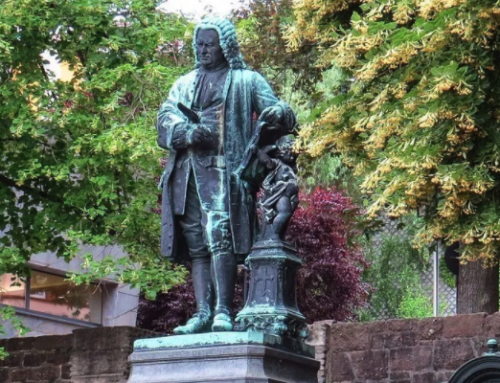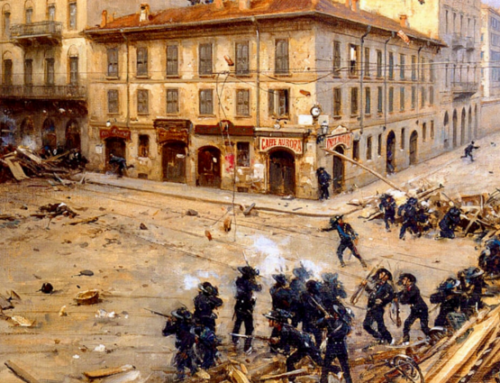A condescending attitude towards common people is typical of today’s political Left, while the Right’s heroes have always been champions of protecting the common man against all sorts of enemies, including an encroaching state.
 I have always loved listening to Aaron Copland’s Fanfare for the Common Man. It is simple and sincere, noble and hopeful. It has all of the qualities that a common man like me hopes to have. I think the idea of the common man is especially compelling in America, a country built on the idea that the common man can thrive and prosper.
I have always loved listening to Aaron Copland’s Fanfare for the Common Man. It is simple and sincere, noble and hopeful. It has all of the qualities that a common man like me hopes to have. I think the idea of the common man is especially compelling in America, a country built on the idea that the common man can thrive and prosper.
Copland has not been the only one interested in the common man. We can see him making appearances throughout Western culture, often in fact as a hero. Consider Figaro the simple barber, a middle-class citizen whose pluck, charm, and ingenuity enable him to outsmart counts, doctors, and the rich. Or P.G. Wodehouse’s Jeeves, a servant of greater intellect and abilities than his idle aristocratic master. In my native Philadelphia, the great film Rocky has given us our most prominent local folk hero: a working stiff who beat the odds and took on the establishment (and later took on the USSR!). Plenty of others come to mind: Mr. Smith (the one who went to Washington), Yossarian the common bombardier, and Christian (the pilgrim who progressed) are some other common-man heroes of mine.
Political elites constantly struggle to win the hearts and minds of common people, if for no other reason because of the great number of votes that they collectively possess. The relationship of the state to the common citizen is a difficult problem, not least because so few of the powerful people of the state come from the ranks of common people. Moreover, the more powerful the politician, the less likely they are to come from or truly understand the ranks of common men. As government grows bigger and more powerful than ever, the separation between mostly powerless people and their well-connected, powerful representatives grows.
The most typical attitude taken by political elites towards the common people of America is a condescending one: that they should be our tutors and caretakers, shepherding us away from any malign influences and towards the life that they have decided we should lead. As Kenneth Minogue pointed out in The Servile Mind, this is an especially ironic attitude in a democracy, where these supposed experts on how to live are chosen by the very masses who they aspire to condescendingly protect from themselves. As Minogue puts it, in this model of government’s relationship to the people, “the foolish are choosing the wise.”
This condescending attitude towards common people is typical of today’s political Left. Superficially, it appears (to some) to be a compassionate philosophy, and has proven popular among two sets of voters in particular: first, those who wish to receive welfare benefits from the state, and second, those who wish to appear compassionate by granting welfare benefits to others. This superficial appearance of compassion to the downtrodden has convinced many that the Left is the true champion of the common man, while the Right is the side of the vested interest, the comfortable plutocrat, the ensconced oppressor. (Indeed, Aaron Copland himself was a Leftist politically, as were countless other artists and writers who have glorified the common man.)
It is only the rare politician or thinker who sees the error in this. Margaret Thatcher pointed it out eloquently. Speaking of the Leftist aspiration to cast the problems of unfortunate individuals onto “society,” she famously said: “There is no such thing as society.” She explained: “There are individual men and women and there are families… there is a living tapestry of men and women and people.” She pointed out that the state is only an intermediary: “No government can do anything except through people.” In other words, the only way a government can solve one common man’s problems is by casting them onto another common man. The middle class—comprised, I assert, of common men—is paying the bill for today’s growing welfare state. Far from being a champion of common people, the Left’s policies lead to taking advantage of one set of common people in favor of another. Some think of the Left as a Robin Hood, taking only from the corrupt rich and giving only to the needy poor. But unlike the sheriff of Nottingham, today’s elites have the resources and knowledge to protect themselves from nearly any redistributive policy; they can hire clever accountants to find tax shelters, or lobbyists to obtain special exceptions. Robin Hood, then, is knocking on the door of the common men of the middle class, who have just enough to be worth robbing, but not enough to adequately protect themselves.
The Right is the proper champion of the common man. The heroes of the Right, including Burke, Locke, and Russell Kirk, have been champions of protecting the common man’s property against all sorts of enemies, including an encroaching state. They celebrate individuality and individual achievement—remember that Figaro, Jeeves, and Rocky Balboa were never recipients of redistributive handouts, but rather depended mostly on themselves, and also their families, friends and communities. Their self-reliance is not merely incidental to their characters—it is why we regard them as heroes.
Government will always be composed of elites, of the well-connected, of the cronies, puppets, and allies of the rich and powerful. Even if someone humble is elected to office, it is almost impossible to avoid being changed by the office—living in the capital city, eating steak and smoking cigars, being constantly flattered and schmoozed must take a toll on any person. So how can any government approach Abraham Lincoln’s ideal of government of the people, by the people, and for the people? How can any government today maintain a proper relationship with the common man? I can see two solutions.
The first solution is to limit the government’s power. Even if political elites remain out of touch with common people and continue to attempt to squeeze money from some common people for the sake of others, by keeping government small and weak we can ensure that their mischief is limited. The second solution is harder to implement. It is to elect leaders who possess the Burkean, Russel Kirk-like moral imagination; to find the rare politician who, like Margaret Thatcher, can see the folly in superficially compassionate policies and imagine creative new and better ways for government to relate to the governed. We cannot wait for these solutions to come from above. If and when we succeed in creating a proper relationship between the government and the people, it will be because of heroic common men like Figaro and Rocky—common men who are worthy of Copland’s fanfare.
The Imaginative Conservative applies the principle of appreciation to the discussion of culture and politics—we approach dialogue with magnanimity rather than with mere civility. Will you help us remain a refreshing oasis in the increasingly contentious arena of modern discourse? Please consider donating now.
The featured image is “Lunch atop a Skyscraper,” published in the New York Herald-Tribune, Oct. 2 1932, by Charles Clyde Ebbets, Tom Kelley, or William Leftwich.in the public domain, courtesy of Wikimedia Commons.







Unfortunately, the imperial and ambitious man comes in many forms, and uses many implements to achieve his social primacy. In addition to well-educated yet nonsensical bureaucrats we have the businessman who strives for economy of scale, to serve an ever-more-illusory mass market. Both sorts are prone to hawking the mega-projects which suit them, and the costs are borne by the common man for their disingenuous enterprises.
Taxes that crush us yes, but so does division of labor.
If the division of labor “crushes” us, that is an odd thing indeed considering how this “crushing” includes less misery, less starvation/malnourishment, and far better material conditions imagined even 100 years ago.